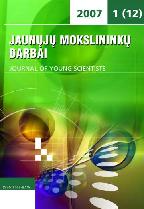Šeimų, kurių vaikai auga globos institucijose, negatyvių išgyvenimų raiška
Peculiarities of Negative Empathy of Families with Children in Foster Care
Author(s): Liuda Radzevičienė, Laimutė SamulionienėSubject(s): Social Sciences
Published by: VšĮ Šiaulių universiteto leidykla
Keywords: Risk group families; negative reactions; child’s placement into foster care.
Summary/Abstract: The work presents research analysis of family relations in risk families and the outcomes of interruption of biosocial links in them. The hypothesis has been formulated: when the child is taken to a foster home psycho-emotional situation at home intensifies negative emotions of the parents and other relatives of the child. The aim of the research: to identify peculiarities of situations which influence negative emotions of the child’s parents and relatives after the child’s placement into foster care. Research data were collected through open type questionnaires and discussions-interviews. Data were processed by using a content analysis method. The members of 6 families of children from Radviliškis foster home took part in this research. Children’s separation from their parents harms relations between the child and the parents. Negative experience in interaction with the relatives and partners does not encourage parents to return to society and make any attempt to return the child to his biological family. Negative emotions indicate a necessity of psychological help for the family because emotional signs after the child’s placement in a foster care institution look like depression and distrust. Negative experience in family interaction influences future development of relations between the child and his family. Summarizing the results of the research such conclusions could be made: Negative emotional experience of interaction in risk group families prevailed. The most significant emotional reactions after the child’s placement into foster care were: loneliness (mentioned in most cases), boredom, envy, sense of alienation, thoughts about death. Situations in family interactions that determine negative emotional reactions were also identified. As most significant, differences in temperament were indicated. Other situations often mentioned by the respondents were: lack of self-help skills, abuse and neglect in the family, strive to manipulate others, negative attitude to the relatives and the family members. Children’s separation from their parents disturbs relations between the family members and the relatives and does not encourage the parents to return to society or try to take the child back to the birthright environment. It is evident that negative attitudes of society and the authorities of social care institutions to such parents encourage them to be more indifferent to their future. It weakens relations between the child and his family. The hypothesis that negative emotions of the parents, whose children are brought up in foster care, are intensified by unfavorable interaction with the family members was proved.
Journal: Jaunųjų mokslininkų darbai
- Issue Year: 2008
- Issue No: 2(18)
- Page Range: 185-190
- Page Count: 1
- Language: Lithuanian

